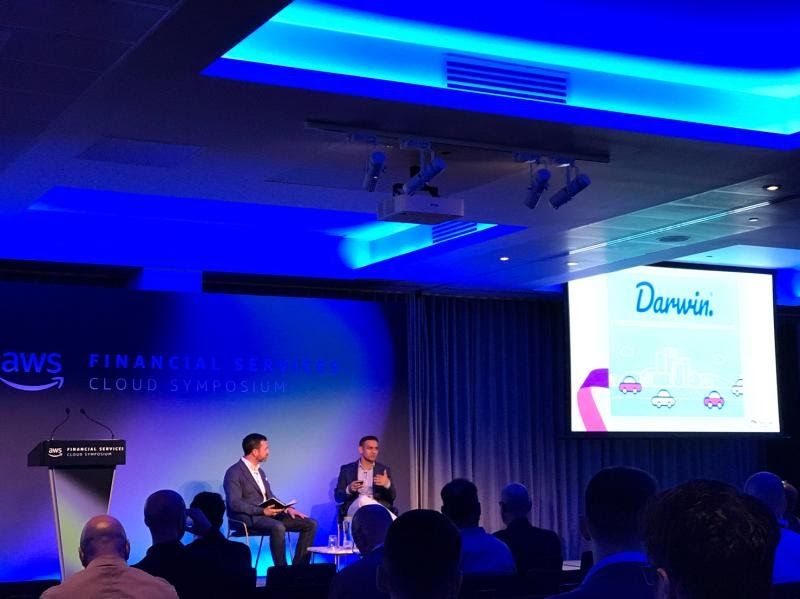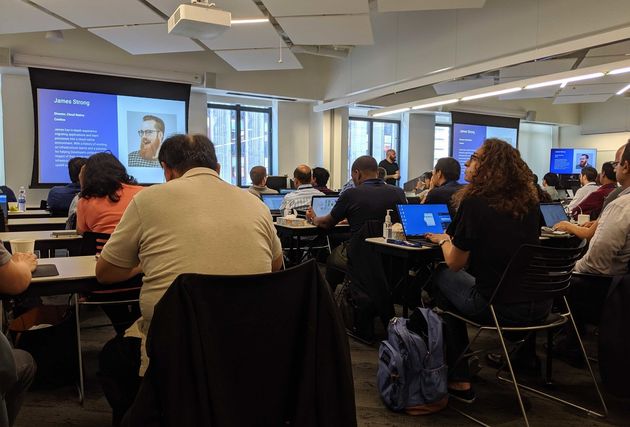How Direct Line Group, AWS and Contino Created a Born-in-the-Cloud Insurance Start-up to Kickstart Innovation
Sumit Bahukhandi, founder of Direct Line Group newco Darwin, joined AWS’s UK Head of Enterprise Solutions Architecture David Elliott at the AWS Financial Services Symposium event on 16 September 2019 to discuss “differentiation through innovation”.
David and Sumit talked through how AWS and Contino supported Direct Line Group in the build out of their Darwin initiative: a born-in-the-cloud, nimble organisation designed to incubate digital innovation and drive insight back to the wider Group.
Darwin is Direct Line Group’s start-up insurance brand announced in March 2019, described by CFO Penny James as being designed to “use different pricing techniques based on machine learning”. You can check out their website here: https://www.darwin-insurance.com.
At the core of the story is an ‘oil tanker and speedboat’ analogy, designed to illustrate how the Darwin initiative helps Direct Line Group to reconcile the company’s need to be agile like a start-up while simultaneously taking advantage of the scale offered by the enterprise organisation.
What this means in practice is not just innovating in a corner, but building in such a way as to help the whole organisation move faster.
So How Did it Work for Darwin?
The advent of cloud computing has meant that where organisations in the insurance sector had previously been talking about deriving competitive advantage from scale, the narrative has changed rapidly to talking about nimbleness as the attribute to drive success in the new technological context.
David asked Sumit about how this change was driven at Direct Line Group. Sumit replied that Direct Line Group looked inwards, and started with asking the question: what’s stopping incumbents in the industry becoming more like nimble players?
One of the conclusions they drew was the operating model of insurance businesses was a key factor in stopping this from happening. Businesses like Direct Line Group have typically been set up like oil tankers: being able to move at great scale but greatly restricted in agility. Thus, they are less able to take advantage of advances in technology to innovate, experiment and iterate that cloud adoption has made possible for newer, more dynamic organisations.
To satisfy that need for agility outside of a traditional operating model, the Darwin organisation was envisaged as a means for DLG to become more nimble. Compared to the oil tanker of the broader group, Darwin was set up as a new company to take advantage of being independent and assumed the role of the speedboat: to go into uncharted waters and share learning back to the mothership.
There were challenges along the way. For example, the insurance industry is heavily regulated for things like using customer data in the cloud. There were skills gaps in areas like security—companies like DLG had been typically used to securing servers—a different beast to cloud-native technologies such as containers.
Further, getting customer data onto the cloud and building a cloud-native ecosystem was difficult. Building a fully containerised ecosystem was very hard. However, with AWS and Contino’s help, they were eventually able to have cloud infrastructure in place that runs by itself—and not had a microsecond of downtime.
Sumit described how Darwin was approached from a test-and-learn perspective on the basis that they should be able to take on feedback and change quickly in response: “what we really built was the ability to iterate”.
David asked about the pace and nature of change: getting set up is one thing, but managing ongoing change is very much another. Sumit’s take was that Darwin was allowed to be “built for tomorrow”. That it was built around experimenting means that they can take steer from what their customers want and adapt accordingly.
Channeling back the learnings from Darwin into the Direct Line Group mothership has been a powerful value proposition.
Sumit explained a number of ways on how the wider Direct Line Group has benefited from the speedboat of Darwin.
Taking a small team of experts to lead change as opposed to an industrial-scale approach was cited as a valuable departure from the previous mode of operations.
They experimented with technologies like serverless at scale to the point where its demonstrated its use as a massively scalable resource, ‘pushing the boundaries’ with regard to their extensive use of Lambda instances.
Sumit concluded that innovation can’t be completely ‘inside or outside’ but should be somewhere in-between, marrying the agility of a start-up with the scale of an enterprise. It’s a hard sweet spot to find but the opportunity is to achieve the best of both worlds when you crack it.
Ultimately, the collaboration of Direct Line Group, AWS and Contino has allowed the customer to start to differentiate in a rapidly changing and increasingly competitive marketplace.
Darwin is about five months old now, and have already been able to take an approach to ‘treat customers as individuals’ by using innovative practices like machine learning, advances that would be difficult to have achieved in when moving at the pace of oil tanker.
Added to that, the introduction of more automation and scalable technology has added savings into the business’ list of processes that reduces their cost and time-to-service for customers, which means that customers get more value for the premiums they pay.
Darwin and DLG will continue working with AWS and Contino to make sure these things continue to happen.






